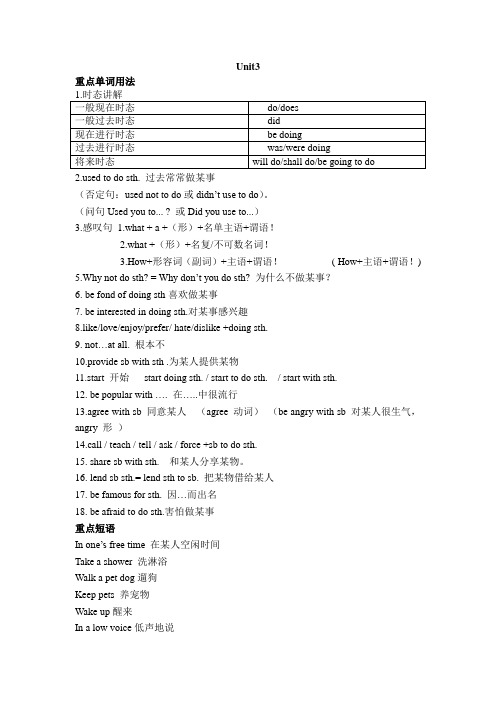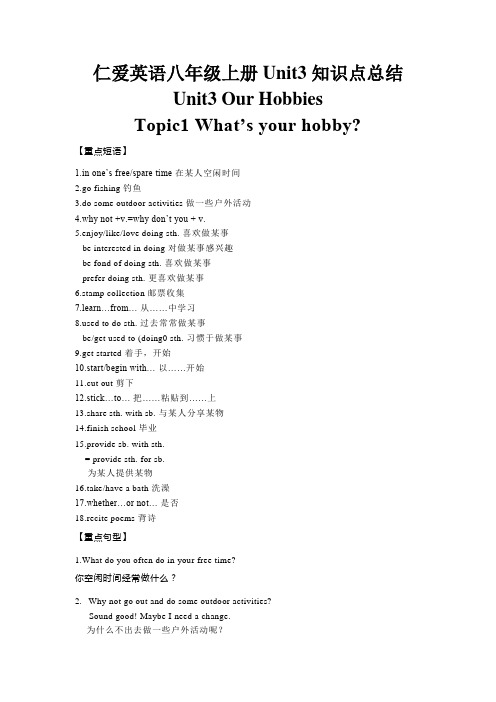仁爱英语_八年级上册第3单元课文翻译、语法总结
北京仁爱版初中英语八年级上册 Unit 3 Topic 1 课文翻译

北京仁爱版初中英语八年级上册 Unit 3 Topic 1 课文翻译SectionC-1a 短文Scrapbookingis a hobby.It was popular for more than 500 years.People called it a friendship book.做剪贴本是一种爱好。
它已经有500多年受欢迎的历史了。
人们把它叫作友谊书。
They kept pictures, letters, poems and other things they wanted to remember.人们会保存照片、信、诗以及其他想要记住的东西。
Today people collect many things in scrapbooks.现在,人们会在贴本中收集很多东西。
Some people have funny collections, like the world's most stupid ideas or pictures o f the world's most ugly dogs.有些人的收藏很有趣,比如世界上最蠢的想法或者世界上最丑的狗的照片。
Other people may collect stories about bad weather.也有人可能收藏关于恶劣天气的故事。
It's is easy to get started.开始做剪贴本是件很容易的事。
First, you should decide what you want to collect.Start with just one idea.首先,你得决定你想要收集什么。
开始时只要有一个想法就够了。
Next, you will need a book with background paper, scissors and glue.接下来,你需要一本有背景图片的书、剪刀和胶水。
You need the scissors to cut out the pictures or stories.你需要用剪刀把照片或故事剪下来。
仁爱英语八年级上册Unit3知识点

仁爱英语八年级上册Unit3知识点本文将详细介绍仁爱英语八年级上册Unit3的知识点,包括重要的单词、表达方式以及语法结构等。
帮助学生更好地掌握此单元的知识,顺利完成学习任务。
一、重要单词1. grade 年级2. schedule 时间表3. term 学期4. memorize 记忆5. revise 复习6. grab 抓住7. cheat 作弊8. summarize 总结9. assignment 作业10. participate 参加二、表达方式1.询问日程安排What’s your schedule like tomorrow?明天你的日程安排怎么样?2. 描述个人喜好及习惯I like studying English every morning.我喜欢每天早上学习英语。
3. 表达自己的看法In my opinion, English is not too difficult.在我看来,英语并不是太难。
4. 建议You should practice speaking English more often.你应该经常练习说英语。
5. 感叹What a difficult test it is!真是一张难题卷!三、语法结构1. 现在进行时现在进行时表示正在进行的动作或状态,常与now、at the moment连用。
例如:I’m doing my homework now.我正在做作业。
2. 过去完成时过去完成时表示过去某一时刻或动作之前完成的动作。
例如:By the time the party began, I had finished my work.派对开始时,我已经完成了自己的工作。
3. 定语从句定语从句用来修饰名词或代词,常用关系代词who、whom、that、which引导。
例如:The girl who is sitting next to me is my sister.坐在我旁边的女孩是我妹妹。
仁爱英语八年级上册Unit3-topic2知识点总结

Unit3 Our HobbiesTopic2 What sweet music!一、重点短语continue doing sth. 继续做某事 be born 出生set up 建立classical music 古典音乐folk songs 民歌stage name 艺名everyday life 日常生活be famous for 因……而著名look for 寻找二、重点句型1. And it sounds great! 听起来好极了。
2. What kind of musical instrument can you play? 你会弹什么种类的乐器?3. We have guitar, violin, piano and drum lessons for just ¥240 each. 我们有吉他课、小提琴课、钢琴课、和打鼓课,每个课程仅需要240元。
4. What do you do in your free time? 你在闲暇之际干些什么?5. Classical music is serious music. 古典音乐是一种很严肃的音乐。
6. Pop music often comes and goes easily. 流行音乐来得快去得也快。
7. They are very popular among young people. 它们在年轻人当中很流行。
8. Guo Lanying, Song Zuying and Tenger are famous for their folk songs. 郭兰英,宋祖英和腾格尔以(唱)民歌而出名。
9. It is one of the most famous rock bands in the world. 它是世界上最著名的摇滚乐队之一。
10. In the fall of 1976, a 14-year-old high school student, Larry Mullen, looked for some musicians. 在1976年的秋天,一个14岁的中学生,Larry Mullen寻找一些音乐家。
(最新)仁爱英语八年级上册三单元教材详解

(最新)仁爱英语八年级上册三单元教材详解Unit 3Topic 1What’s your hobby ?Section A1.Ialso rent DVDs and watch them at home.rent租借,出租borrow (主语)借入向某人或某处借borrow…from…lend(主语)借出lend sb. sth. = lend sth. to sb.2. What do you often do in your freetime ?In one’s spare time = in one’s free time 在某人空闲时间里3.why not go out and do some outdoor activities ?(1)表建议的句型有:Why not = Why don’t you,后接动词原形,如; Why not/ Why don’t you go out ?What about = How about 后接动词ing,如:What / How about going out ?Shall we + 动词原形,如:Shall we go out ?(2) do some outdoor activities 做户外活动4. Maybe I need a change.change ①名词,改变,如:a great change。
②动词,改变,如:He changed his mind.(改了他的主意) ③名词,零钱,如:Here’s your change.5. I am interested in playing basketball.be interested in 对…感兴趣6. Ialso enjoy listening to music.Enjoy 后只能接动词ing形式,不能接不定式。
Like,love ,prefer 后可接ing形式,也可以接不定式。
Unit3-仁爱八上知识点总结

Unit 3 Our HobbiesTopic 1 What’s your hobby?一、重点词汇hobby 爱好friendship友谊knowledge 知识maybe 可能,也许plant 植物;种植comfort 安慰stick 粘贴,粘住self-introduction 自我介绍everyday life 日常生活whether···or not / if 是否such as 例如Take/have a bath/shower 洗澡go dancing 跳舞go boating/rowing 划船play volleyball 打排球drawing/painting 画画collecting stamps 集邮collecting coins 收藏硬币collection listening to pop music/classical music 听流行音乐/古典音乐be interested in (doing) = show interest in 对······感兴趣love/like doing sth. 喜欢做某事enjoy doing sth. 喜欢做某事prefer doing sth. 喜欢做某事be fond of doing sth. 喜欢做某事hate doing sth. 讨厌做某事have fun doing sth.= It’s fun to do sth. 做某事很开心Sounds good!听起来很好。
What beautiful stamps! 多么美丽的邮票啊!It is easy to get started.很容易着手/ 开始。
get started 开始collect few things 几乎不收集东西provide sb. with sth. = provide sth for sb. 为某人提供某物walk a pet dog 遛狗in one’s free/spare time 在空余时间take care of 照顾= look after二、句型、语法1.I used to listen to rock music but now I collect telephone cards and paintings. 我过去常听摇滚乐,可现在我集电话卡和画。
仁爱英语八年级上册unit 3知识点归纳

Unit3重点单词用法ed to do sth. 过去常常做某事(否定句:used not to do或didn’t use to do)。
(问句Used you to... ? 或Did you use to...)3.感叹句1.what + a +(形)+名单主语+谓语!2.what +(形)+名复/不可数名词!3.How+形容词(副词)+主语+谓语!( How+主语+谓语!)5.Why not do sth? = Why don’t you do sth? 为什么不做某事?6. be fond of doing sth喜欢做某事7. be interested in doing sth.对某事感兴趣8.like/love/enjoy/prefer/ hate/dislike +doing sth.9. not…at all.根本不10.provide sb with sth .为某人提供某物11.start 开始start doing sth. / start to do sth. / start with sth.12. be popular with …. 在…..中很流行13.agree with sb 同意某人(agree 动词)(be angry with sb 对某人很生气,angry 形)14.call / teach / tell / ask / force +sb to do sth.15. share sb with sth. 和某人分享某物。
16. lend sb sth.= lend sth to sb. 把某物借给某人17. be famous for sth. 因…而出名18. be afraid to do sth.害怕做某事重点短语In one’s free time 在某人空闲时间Take a shower 洗淋浴Walk a pet dog遛狗Keep pets 养宠物Wake up醒来In a low voice低声地说。
年秋季仁爱英语八年级上册Unit3topic3重点知识点总结及练习

八年级上册Unit 3Topic3What wereyoudoingatthis time yesterday?一.重点句型:Section A1.The telephone rings whileJane is practicingthe violin.简在练习小提琴的时候,电话铃响了。
while 在此意为“当……的时候,与……同时”,引导时间状语从句,从句中要延续性动词。
Somebodybroke in while I was out. 我出门不在时,有人破门而入。
注意:when &while 意思相近,都可引导时间状语从句。
When意为:“当时”,可表瞬间时间点,主从句所述动作、事情可同事发生,也可先后。
Itwas snowing when wegot there. 我们到达那里时正在下雪。
(同时)Hewent homewhen he finished his work. 我做完工作就回家了。
(表示动作的先后)while 用于两个延续性动作同时发生。
Mother was cookingwhile fatherwas watching TV. 爸爸看电视的时候妈妈在做饭。
2. Hold the line, please.请等一会儿。
hold the line =hold on= wait amoment =just a moment 为打电话用语,意为“等一会儿”;3.What wereyou doing at thistime yesterday?昨天这个时候,你在做什么?该句是过去进行时,由was/were+现在分词构成,意为“昨天这个时候你在干什么?”(过去正在进行)I was reading at thistime yesterday.昨天这个时候我在读书。
3.I calledyou to go totheEnglish Cornerbutno one answered. 我给你打电话了,但是没有人接。
仁爱英语八年级上册Unit3知识点总结

仁爱英语八年级上册Unit3知识点总结Unit3 Our HobbiesTopic1 What’s your hobby?【重点短语】1.in one’s free/spare time在某人空闲时间2.go fishing 钓鱼3.do some outdoor activities 做一些户外活动4.why not +v.=why don’t you + v.5.enjoy/like/love doing sth. 喜欢做某事be interested in doing 对做某事感兴趣be fond of doing sth. 喜欢做某事prefer doing sth. 更喜欢做某事6.stamp collection 邮票收集7.learn…from…从……中学习ed to do sth. 过去常常做某事be/get used to (doing0 sth. 习惯于做某事9.get started 着手,开始10.start/begin with…以……开始11.cut out 剪下12.stick…to…把……粘贴到……上13.share sth. with sb. 与某人分享某物14.finish school 毕业15.provide sb. with sth.= provide sth. for sb.为某人提供某物16.take/have a bath 洗澡17.whether…or not…是否18.recite poems 背诗【重点句型】1.What do you often do in your free time?你空闲时间经常做什么?2.--Why not go out and do some outdoor activities?--Sound good! Maybe I need a change.--为什么不出去做一些户外活动呢?--听起来不错,也许我需要改变。
- 1、下载文档前请自行甄别文档内容的完整性,平台不提供额外的编辑、内容补充、找答案等附加服务。
- 2、"仅部分预览"的文档,不可在线预览部分如存在完整性等问题,可反馈申请退款(可完整预览的文档不适用该条件!)。
- 3、如文档侵犯您的权益,请联系客服反馈,我们会尽快为您处理(人工客服工作时间:9:00-18:30)。
UNIT 3 our habbiesTopic1Section A1、 What do you do in your free time ?在空闲时间里你做什么?2、 go fishing 去钓鱼3、 enjoy reading stories and listening to music 喜欢读故事书听音乐4、 What’s your habby?你的爱好是什么?5、 a movie fan 电影迷6、 go to the movie theater 去看电影7、 Why not go out and do some outdoor activities?为什么不出去做户外活动?8、 do some outdoor activities 做户外活动9、 sounds good 听起来很好10、 be interested in 对。
感兴趣11、 play the guitar 弹吉他12、 be fond of 喜欢13、 play soccer 踢足球14、 walk a pet dog 遛狗15、 collect stamps 集邮16、 plant flowers 种花17、 climb mountains 爬山18、 fly kites 放风筝19、 go travelling 去旅行20、 go swimming 去游泳Section B21、 It must be a great fun 那一定很有趣22、 used to do sth.否定式:didn’t use to do sth 过去常常做某事(但现在不做了)23、 Kangkang is fond of swimming 康康喜欢游泳24、 What hobbies did you use to have ?你过去有什么爱好?25、 What are you looking at ?你在看什么呢?26、 I am going swimming 我要去游泳27、 learn...from 向。
学习28、 telephone cards 电话卡29、 model planes 飞机模型30、 photos of famous stars 明星照片31、 keep pets 养宠物32、 listen to music 听音乐33、 watch TV 看电视34、 play computer games 玩电脑游戏35、 pop music 流行音乐36、 play sports 做运动Section C37、 more than = over 多于。
38、 It’s easy to do sth. 做某事很容易39、 got started 开始40、 start with 由。
开始41、 a book with background paper 带有背景图案的书42、 cut out 切割43、 stick ...to ...粘贴到。
44、 share ...with ..与。
分享45、 call sb. sth. 把。
称之为。
46、 You should decide what you want to collect.你应该决定你要收集什么。
47、 need sth. to do sth. 需要做某事48、 How do you make a scrapbook?你如何做剪贴本?49、 What did you use to do in spring ?你过去常在春天做什么?Section D50、 maybe 可能也许51、 provide sb.with sth. = provide sth. for sb. 为某人提供某物52、 take a bath = have a bath 洗澡53、 whether = if 多数情况下可通用。
但1)句子中有 or not 时,用whether : I wonder whether it is big enough or not .2)放在不定式前,与不定式组成词组:She hasn’t decided whether to go or not .54、 take sb. out 带某人出去55、 be special to sb.对某人来说特殊56、 I used to collect basebakll cards 我过去常收集棒球卡57、 I used to enjoy pop music ,but now I don’t like it 我过去喜欢流行音乐但现在不喜欢了58、 I usedn’t to go shopping ,but now I like it .我过去不常购物,但现在喜欢购物59、 I am fond of acting 我喜欢表演60、 I am interested in playing basketball.我对打篮球感兴趣。
61、 I prefer playing soccor.我更喜欢踢足球。
62、 What hobbies did you usd to have?你过去有什么爱好?63、 What does it look like? 它长的什么样?64、 What pet do you like ? / What pet don’t you like ?你喜欢/ 不喜欢什么宠物?重点语法:used to 的用法used to 意为“过去常常”“曾经”,表示过去的习惯动作或者状态,并且这种情况现在不复存在。
1、My father used to be a farmer ,but now he is an office worker.我父亲过去是农民,但现在是职员。
2、I used to enjoy pop music,but now I don’t like it.我过去喜欢流行音乐,但现在我不喜欢它。
其否定形式为:didn’t use to...或者usedn’t to....1、He didn’t use to go there.他过去不常去那儿。
2、I usedn’t to go shopping,but now I like it.我过去不常去购物,但现在我喜欢它。
其疑问形式及回答:e to ...?Yes,...did./No,...didn’t.或者Used...to...?Yes,ed to ./No,edn’t to(used not to).1、Did he use to come by bus?Yes , he did. No, he didn’t .===Used he to come by bus?Yes ,he used to . No, he, usedn’t to.2、What bobbies did you use to have?=What hobbies used you to have?Topic 2 What sweet musicsection A1、 What are you going to do this Sunday evening ? 本周日晚上你要做什么?2、 I’m going to a concert .我要去参加音乐会。
3、 How exciting ! 多么令人激动呀!4、 Who is going to sing at the concert ? 谁要在演唱会上唱歌?5、 It sounds beautiful . 听起来很优美。
6、 give/hold a concert 举办音乐会7、 Where is she going to give a concert? 她要在哪举办演唱会?8、 What time is it going to start ?什么时候开始?9、 Why not come with me ?为什么不和我一起去呢?10、 watch movies 看电影11、 What a pity !多么遗憾呀!12、 I can lend you some CDs of her songs.我可以从你这借一些她的歌盘吗?13、 Thanks a lot . You are welcome .多谢。
不客气!14、 welcome to our music lessons 欢迎来参见我们的音乐课15、 want to become a musician 想要成为音乐家16、 want to make beautiful music 想要创作优美的音乐17、 want to become happy in life 在生活中想变得开心section B1、 What sweet music !多么甜美的音乐呀!2、 I usually listen to the music in my free time .在我业余时间里我常听音乐。
3、 What kind of music do you like ?你喜欢哪种音乐?4、 It’s hard to say . 很难说5、 I used to enjoy pop music ,but now I like folk music我曾经喜欢流行音乐现在喜欢民乐6、 classical music 古典音乐7、 I hate listening to rock music.我讨厌听摇滚音乐8、 country music 乡村音乐9、 this kind of music 这种音乐10、 pop music 流行音乐11、 everyday life 日常生活12、 be popular with sb. 受某人欢迎13、 folk music 民族音乐14、 a part of 。
的一部分15、 a part of the working people’s songs 劳动人民歌曲的一部分16、 be famous for 以。
著称17、 be famous as 以某种身份而让人们认知,He is famous as a fine player .他以一个优秀的运动员而出名!Section C1、 know about 知道了解2、 thank about 思考3、 at the age of .... = when sb. was .... 在某人几岁时4、 He was able to play the piano by himself.他自己能弹钢琴5、 be born 出生6、 start doing sth.= begin doing sth.开始做某事7、 give sb.lessons = give sb. a lesson 给某人上课8、 on the piano 在钢琴上9、 have a lesson 上课10、 as well as 和...一样好11、 He started to write music by himself .他开始独自谱曲12、 an amazing child 神童13、 a born musician 天生的音乐家14、 ask sb. to do sth. 让某人做某事15、 What do you thank of ...? 你觉得怎么样?Section D1、 all kinds of ...各种各样的2、 in the world 在世界上3、 make sb. happy 使某人快乐4、 peace of mind 心灵的宁静5、 teach sb.to do sth.教某人做某事6、 It is a great fun for sb.对某人来说是非常快乐的。
